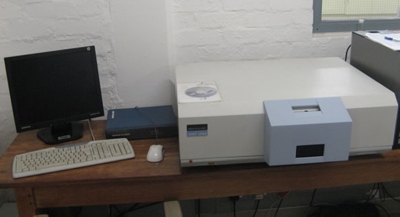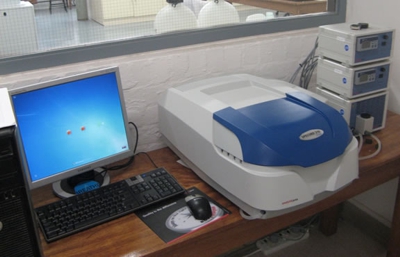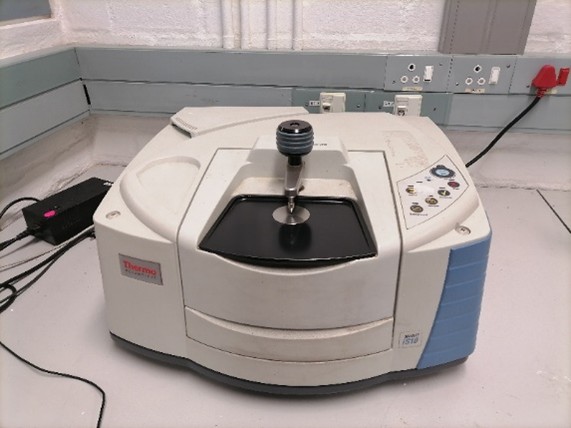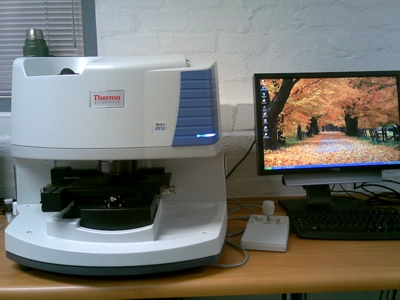Contact us
Division of Polymer Science
Department of Chemistry
and Polymer Science
University of Stellenbosch
Private Bag X1
7602 MATIELAND
South Africa
Telephone:
+27 (21) 808 3172
Where to find us
GPS Coordinates:
S 33° 55' 58" E 18° 51' 59"
Equipment available at Polymer Science
Last revision: 6 June, 2025
Spectroscopy
Fluorescence/luminescence UV-Vis FTIR FTIR microscope
Fluorescence/luminescence spectrophotometer
Perkin Elmer LS50B
Room: 1014
Contact person: Dr Helen Pfukwa
The Perkin Elmer LS 50B instrument is well suited for bio-analytical applications, as well as for analysing natural polymers, synthetic polymer and conjugates. With monochromators on both excitation and emission sides, it offers precise scans from 200 to 800 nm (excitation) and 200 to 900 nm (emission). The instrument runs on Fl Winlab version 4, it supports four operating modes: single scan, accumulation, kinetics or 3D mode.
Analytik Jena Specord 210 plus
Room: 1014
Contac person: Dr Helen Pfukwa
UV spectroscopy measures the wavelength (180 – 1100 nm) and degree of light absorbed by a compound. It is primarily used to measure the absorbance of conjugated and aromatic compounds. Temperature control (Peltier controlled cell holders: -10 – 105°C) is also available to observe the absorbance spectra as a function of temperature.
Fourier transform infrared spectrophotometer
Room: 1009
Responsible person: Dr Helen Pfukwa
The Nicolet iS10 FTIR equipment is regarded as essential with regard to characterization of materials, and in particular with regard to following degradation reactions of polymers. As part of fundamental research the FTIR spectrophotometer is a way of simply identifying subtle morphological changes. ATR and PAS detectors are already available for addition to the FTIR spectrometer.
This instrument consists of an ATR (attenuated total reflectance) unit for fast surface analysis of samples as well as a transmission–FTIR unit. It is a complete infrared spectroscopy system for routine analytical needs. It delivers the highest confidence in the verification and identification of materials and is designed for maximum assurance in its ability to sample and solve challenging problems with a minimal investment in time.
Fourier transform infrared microscope
Room: 1009
Responsible person: Dr Helen Pfukwa
The Nicolet iN10 IR Microscope is an integrated infrared microsampling system that provides the highest available IR sensitivity with no need for external FT-IR spectrometer. The integrated design delivers the highest possible throughput in infrared microscopy, which allows the analysis of samples as small as 50 microns with no need for LN2, while providing exceptional sensitivity down to 10 micron, when using the cooled detector. All Nicolet iN10 infrared beam path mirrors are gold coated, with the exception of the objective and the condenser, for maximum performance in any sampling mode. We upgraded the microscope with a motorized stage for mapping experiments in transmission, reflection and ATR sampling modes. The pixel size in imaging mode can be 50, 25, 6.25 and 2 microns (ATR). The imaging optical zoom provides 6.25 micron high spatial resolution in transmission and reflection, and better than 2 micron spatial resolution in ATR mode.
The Nicolet iN10 infrared microscope is also designed to provide the highest confidence in the results, offering valuable features for the day-to-day user like:
~ Simultaneous viewing and collection - ensures consistency between data and image
~ True-view aperture - ensures consistency between measured area and data
~ ValPro option - ensures system performance qualification, in any sampling mode
The Nicolet iN10 is fully automated and software controlled, with the exception of the stage, which can be manual or motorized. OMNIC Picta™ software interface provide a truly intuitive interface and it is specifically designed to allow non-skilled personnel to measure samples reliably, consistently and with minimum learning requirements.






